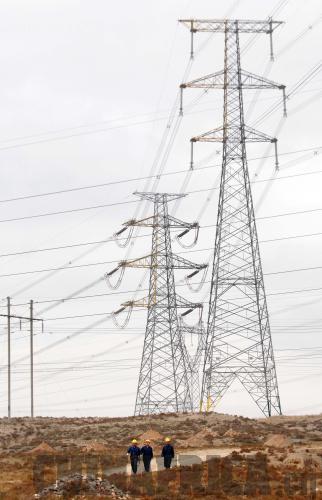| 
Chinese consumers are caught up in a power play – quite literally. When it comes to selecting an electricity supplier, choices are limited to the State Grid Corp. in the north and China Southern Power Grid in the south. Monopoly of the industry has long been the status quo in China, but now there are signs that the situation is changing.
In the small town of Weiqiao, Shandong Province, consumers have options when it comes to their electricity needs. Rated as one of China's top 100 richest towns, Weiqiao has its power supplied by the Weiqiao Pioneering Group Co. Ltd. (Weiqiao Group). Zhang Shiping, the group's Chairman of the Board of Directors, was named as the richest man in the province by the Hurun Rich List in 2011.
Like many other large production enterprises nationwide, the Weiqiao Group has its own power generation plant. But the company diverges from the norm in that it has both a power plant and power transmission network. This enables the company to supply surplus electricity to other surrounding enterprises and residents.
"We are using electricity of Weiqiao Group as it is only 0.6 yuan ($0.095) a kwh, which is much cheaper than the state power grid, which is more than 0.8 yuan ($0.126) a kwh," said the General Manager of Luzhong Hotel in Weiqiao, who only gave his surname of Li, in an interview with Of Week, a magazine targeting electricity development in China. In order to deal with any emergencies, his hotel is also connected to the State Grid. "At least, it is more stable," he added.
According to Li, if his hotel buys electricity only from the State Grid, he needs to pay about 20,000 yuan ($3,174.6) a month; but using electricity from the Weiqiao Group, his monthly power bill is reduced to 12,000-13,000 yuan ($1,904.8-2,063.5). "For big factories, the difference is ever greater," Li said.
The Weiqiao Group also supplies power to nearby residents at a rate of 0.35 yuan ($0.056) a kwh, also much lower than the State Grid at 0.6 yuan ($0.095) a kwh.
Shattering monopolies
This alternative power supply is known as the "Weiqiao mode." Though this is widely applauded by consumers as it has the potential of breaking the state power grid's monopoly, official resources show that the company's practice has violated the Chinese law.
"It's fine for a company-affiliated power plant to supply electricity for its own use," Ouyang Changyu, Deputy Secretary General of China Electricity Council, told the media. "But supplying electricity to other consumers violates the current Electricity Law."
According to China's Electricity Law, there shall be only one power-supply enterprise in each electricity service area. Weiqiao is within the State Grid service area and should be covered by the corporation. This controversial stipulation is widely believed to encourage monopoly.
To vie for market share, the Weiqiao Group and Shandong Electric Power Corp. under the State Grid have had disputes in recent years, some leading to conflict. However, with support from the provincial government, the Weiqiao mode continues and is growing stronger.
Such conflict has not only happened in Weiqiao, but also between the State Grid and Shaanxi Regional Electric Power Group Co. Ltd., a company under the Shaanxi Provincial Government operating an electricity transmission network.
Industry insiders say these conflicts have exerted pressure on the existing electricity supply system, making decision makers rethink China's electric power supply market.
"The events in Shaanxi and Weiqiao are efforts to break the monopoly power supply system in China, established according to the Electricity Law," Wang Shusheng, Associate Professor of Electricity Law at North China Electric Power University, told Legal Weekly.
Consumer dissatisfaction
The monopoly in the electricity market has led to the fact that electricity users have fewer, or even no options in selecting suppliers. This in turn means consumers don't have a say in the pricing of electricity.
According to the National Development and Reform Commission, China's top economic planner, China officially introduced a graded electricity pricing system on July 1. Based on the system, the more electricity a family uses in a month, the higher the price it will pay. Though different regions have different electricity prices, the average rates have increased.
Take Beijing, for example. For a family using less than 240 kwh of electricity a month, the price remains unchanged at 0.48 yuan ($0.076) a kwh. For an amount exceeding 240 kwh but less than 400 kwh a month, the price rises by 0.05 yuan ($0.0079) a kwh; while an amount of more than 400 kwh in a month sees the price go up by 0.3 yuan ($0.048) a kwh.
"Although the rate in the first level (monthly utilization of no more than 240 kwh) remains unchanged, 240 kwh a month is definitely not enough for a family in Beijing, especially in the summer when we use air conditioners frequently," Luo Fang, a resident living in Xicheng District of Beijing, told China Economic Weekly. "This means we need to pay more," she added.
According to Luo, her four-member family uses about 340 kwh a month on average. "It's unfair that they increase the price of the extra-used electricity, but do not cut the price for those who use less," she noted. "Anyway, no one would listen to my opinions."
Many people in Beijing had no choice but to accept the price hikes. "It is difficult for common people to have their voices of objection on rising prices heard," Wang Wenzhang, Professor of Social Development Institute of Peking University told Democracy and Law Times.
It is reported that from 2004 to 2011, China's electricity prices were adjusted 12 times, mostly in an upward trend.
|